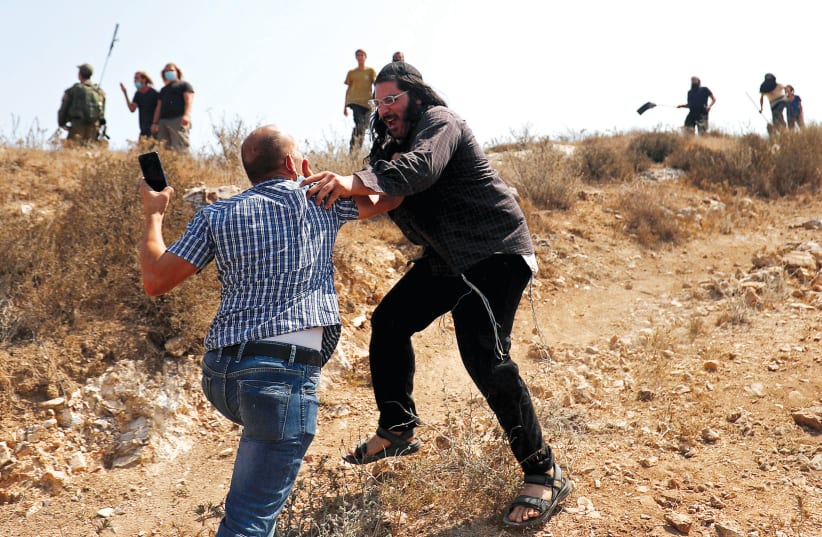Much of this wanton violence and destruction of property has been taking place for several years under the slogan of “tag mehir” (price tag).
Young extremists from many settlements in the West Bank have been emboldened by the teachings of some of their more extremist rabbis and their writings for many years. One of the most infamous books, called Torat Hamelech (The King’s Torah), was published by the Od Yosef Chai Yeshiva. It is an explicitly racist document, which was written by Rabbis Yitzhak Shapira and Yosef Elitzur of the radical settlement of Yitzhar. This book specifically countenances discrimination against non-Jews and even murder. Fortunately, Elitzur was finally indicted by a court in Israel a few weeks ago, after many years of incitement in a case brought to the Supreme Court by the Israel Movement for Reform Judaism and the Tag Meir Forum.
Inspired by these rabbis, hundreds of hilltop youth and other radical Jewish settlers have committed many acts of vandalism against churches and mosques in the West Bank and in Israel, thrown rocks at Palestinian cars, destroyed olive groves and burned cars, and there have even been outrageous crimes of murder. They are rarely arrested and brought to justice. The only exception was the arrest and imprisonment of one Jewish terrorist, who, with the help of two minors, kidnapped a Palestinian teenager from Shuafat and burned him to death in the Jerusalem Forest in 2016.
In contrast to Tag Mehir, there has arisen a counter movement known as Tag Meir (Light Tag), which was founded during Hanukkah in 2011, as a reaction to the growing violence and hate crimes of Jewish settler youth at that time. Since then, the Tag Meir Forum – comprising members of more than 50 diverse Jewish organizations throughout Israeli society – has conducted hundreds of solidarity visits to institutions and people who have been harmed by these hate crimes. As one of the founders of the Tag Meir Forum, I participated in many of these important and meaningful visits over the years, including solidarity visits to Jewish victims of hate crimes as well as Palestinian victims.
In addition, the Tag Meir Forum has been engaged in lobbying the Knesset as well as in educational programs to educate people against racism. The Forum is also very active on social media. It has 60,000 followers on three Facebook pages, in Hebrew, English and Arabic.
I recently asked the concerned, committed and courageous chairperson of the Tag Meir Forum, Dr. Gadi Gvaryahu, from Rehovot, to tell me how he sees the recent spike of hate crimes in the West Bank. His response:
It is total anarchy and it is spilling over inside Israel, especially into the extremist Haredi communities, where we see growing radical violent actions against police and against civilians, including the recent burning of a bus in the center of Bnei Brak.
I also asked Gvaryahu what motivates him as a religious Jew to engage in combating this growing racism and these horrific hate crimes. His response was automatic and immediate:
“It is basic Judaism. We are told 36 times in the Torah to remember the stranger since ‘we were strangers in the land of Egypt.’ Also, we are guided by the verse, ‘Refrain from doing evil and do good.’ As Jews, we are commanded to care for the other. Also, as Jews who suffered so much as a minority in other places throughout our history, we ought to treat non-Jews compassionately and fairly in our society.”
In my view, it is time for more light and less might in the West Bank. The police must reign in these irresponsible anarchist youth! The security authorities – who know very well who these people are and where they eat and sleep – need to act now, to prevent the situation from getting totally out of hand, which would be very dangerous for all concerned. By the way, it is also the moral thing to do, for a Jewish state. It is time for those in power to realize that we should treat others as we would wish ourselves to be treated as human beings under another people’s control.
The writer is a retired lecturer, educator and interreligious peace builder. His most recent book is The Other Peace Process: Interreligious Dialogue, a View from Jerusalem (Hamilton Books, 2017). He is currently working on a book about peace builders. For more about him, see his website: https://ronkronish.com
